In the grocery store, there is an abundance of options for cooking oils, ranging from olive to canola to sesame. Each oil possesses distinctive flavor profiles and varying heat tolerances, making them suitable for different culinary purposes. Alongside utility, consumers also prioritize the nutritional content of cooking oils. Increasingly, people are steering clear of conventional choices like vegetable and corn oil, favoring oils rich in healthy fats to promote heart health and overall wellness.
The quality of the cooking oils you select is pivotal in preserving their nutritional value and guaranteeing optimal flavor in your cooked dishes.
The techniques used for extraction and processing significantly impact the quality of cooking oils. Mechanical methods like cold-pressing retain nutritional benefits, while chemical extraction methods, which may involve substances like hexane, can introduce trace residues that compromise purity. Additionally, there are concerns about rancidity and adulteration, where oils may be mixed with lower-quality varieties.
Choosing the appropriate oil for your health and culinary requirements, whether for sautéing, frying, or drizzling, can be a complex task. To simplify the process, we've curated a list of 10 high-quality cooking oils for you to explore.
How we selected the highest-quality cooking oils.
Selecting a high-quality cooking oil involves three key considerations: the extraction method, the nutritional density, and the integrity of the oil's sourcing methods.
Extraction method
Certain oils are extracted through cost-effective and rapid methods known as chemical expression, which involve synthetic chemicals like hexane. In contrast, others employ gentler techniques such as expeller-pressing or cold-pressing, which maintain the oil's nutritional integrity without the use of synthetic additives.
Although there are concerns regarding residual hexane levels post-processing, these chemical methods may not inherently pose health risks, particularly when oils are consumed in moderation, as recommended for all cooking oils.
Nutrition: does oil type matter?
Due to concerns about chemical extractions and some inconclusive studies, many consumers worry about the potential negative effects of seed oils, such as inflammation or heart disease. However, the reality is that certain seed or vegetable oils can actually support your health, depending on your choice. For instance, research has shown that canola oil may reduce total cholesterol and LDL cholesterol levels in healthy individuals. Olive oil, renowned for its health benefits, is another example.
The key is to incorporate a variety of oils into your diet rather than relying heavily on just one type. It's also important to use them in moderation and select the appropriate oil for your intended culinary use.
When it comes to searing or frying, selecting oils that can tolerate high temperatures without oxidizing is critical. Oxidation can produce potentially harmful trans fats and free radicals, which are highly reactive molecules that may harm cells, proteins, and DNA, contributing to aging and various diseases. Therefore, it's advisable to avoid delicate oils like walnuts or sesame oil for cooking.
Quality testing
While olive oil undergoes rigorous monitoring via industry standards and global competitions, other cooking oils may lack such stringent standardization or oversight. Opting for oils from reputable brands that prioritize transparency in their sourcing and production processes can aid in identifying high-quality options. Keep an eye out for certifications like USDA Organic or Non-GMO Project Verified, which signify adherence to rigorous standards.
THE BEST COOKING OILS
To assist you in your search for the ideal cooking oil, we've compiled a list of 10 options that excel in terms of quality, flavor, and health benefits, catering to a variety of cooking requirements.
1) California Olive Ranch Olive Oil
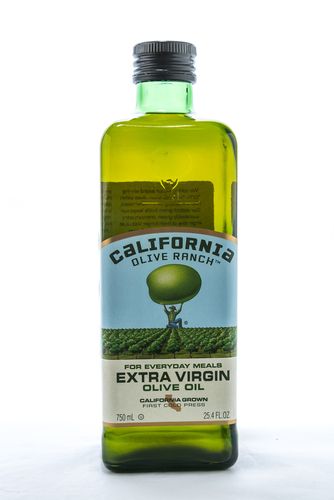
California Olive Ranch Extra Virgin Olive Oil has garnered over 230 accolades within a decade, upholding stringent standards and complete transparency, ensuring top-notch quality. With many blends sourced entirely from California, consumers can trust in the abundance of antioxidants and omega-3 fatty acids present in their oils, which have been associated with reducing the risk of cardiovascular disease. Moreover, olive oil is a cornerstone of the Mediterranean diet, renowned for its potential to combat inflammation and mitigate health hazards.
2) Primal Kitchen Pure Avocado Oil
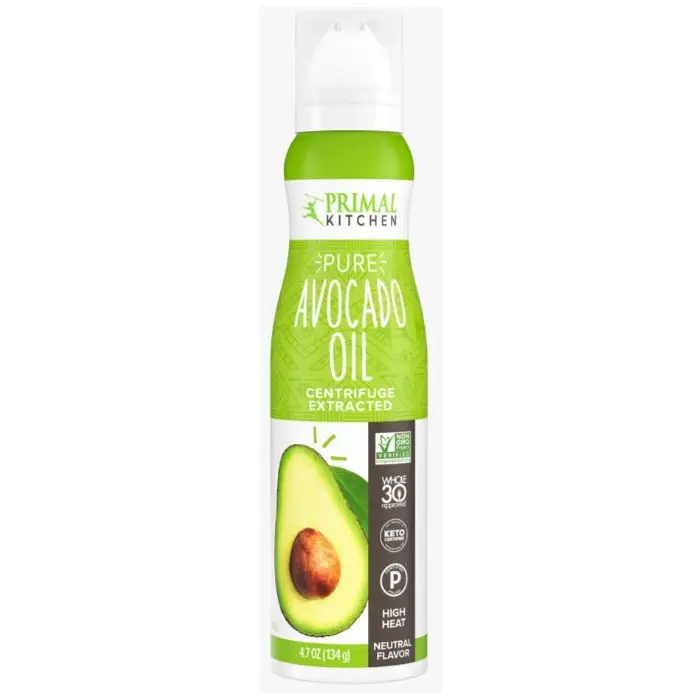
For a high-heat cooking oil suitable for temperatures up to approximately 520 degrees, consider Primal Kitchen's Pure Avocado Oil. This oil stands out for its simplicity, with avocado oil being its sole ingredient. It is extracted through a centrifuge process, where ripe avocados are mashed and spun at high speeds to separate the oil from the pulp and water, ensuring no chemicals are added during production. By consuming this oil, you're exclusively ingesting beneficial components like monounsaturated fats, which, as endorsed by the American Heart Association, have the potential to lower levels of "bad" cholesterol in the bloodstream.
3) Fresh Press Farm Sunflower Oil

Fresh Press Farms produces premium quality Sunflower Oil that is extracted through the cold-pressing method. The oil is made using high-oleic sunflower seeds that are specifically bred to provide more monounsaturated fatty acids due to their higher oleic acid content. The use of high-oleic seeds is crucial because studies suggest that consuming oils with high levels of oleic acid when substituted for fats and oils that are higher in saturated fat, may lower the risk of coronary heart disease. The FDA has recognized this potential benefit and granted a qualified health claim allowing the communication of the link between these oils and heart disease risk. Additionally, the high oleic sunflower oil manufactured by Fresh Press Farms meets the criteria for the American Heart Association Heart Check. It also has a high smoke point of 450 degrees Fahrenheit making it ideal for cooking, frying, or baking.
4) Spectrum Organic Canola Oil
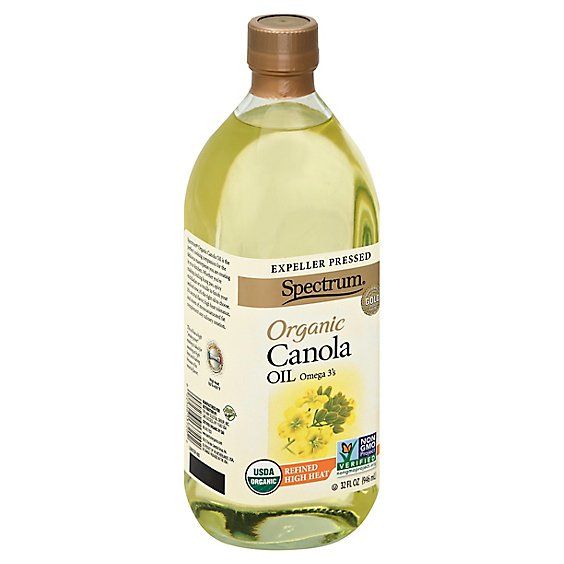
Canola oil is renowned for its neutral flavor profile, making it an excellent choice for cooking without imparting a nutty or tangy taste to your dishes. Ideal for medium-to-high heat cooking, it boasts a flashpoint of up to 450 degrees Fahrenheit. Spectrum's Organic Canola Oil stands out as a premium option, being both USDA-certified organic and non-GMO verified. Notably, this canola oil is expeller pressed, eschewing the use of hexane during the extraction process.
Research indicates that diets rich in canola oil can lead to reduced plasma cholesterol levels compared to those high in saturated fatty acids, further underscoring its health benefits.
5) La Tourangelle Pistachio Oil
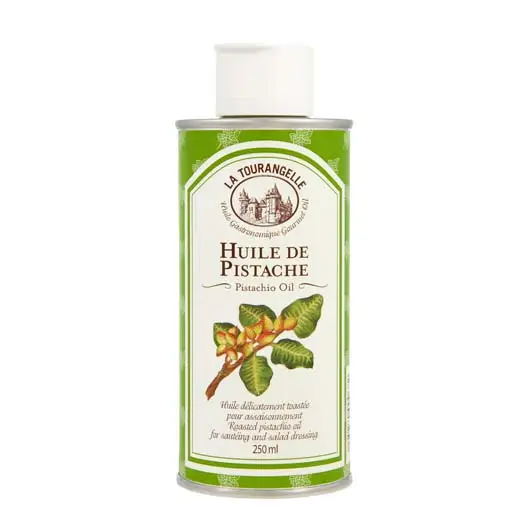
While pistachio oil may not be as well-known in America, it is highly esteemed by the French for its rich flavor profile and robust enhancement of dishes. La Tourangelle's Pistachio Oil, in particular, is notable for its high content of omega-9 fatty acids, totaling 7 grams, which can help combat inflammation and potentially possess anti-cancer properties. While the brand suggests that it's suitable for high-heat cooking, some sources recommend its use for low-heat cooking. Thus, we advise gradually increasing the heat when using pistachio oil to determine its optimal application for your culinary needs. Additionally, the bold and distinctive flavor of this oil makes it a delightful addition as a drizzle over salads or your favorite fruit medley.
6) Fresh Press Farms High Heat Oil
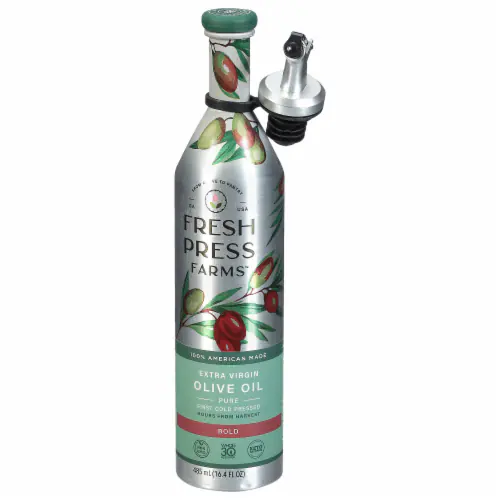
Count us in for a pure cold-pressed olive oil that can withstand cooking temperatures of up to 475 degrees Fahrenheit. This unicorn oil is made possible by employing a meticulous fine filtering process utilizing natural wood-based cellulose, ensuring heat stability. Not limited to cooking, you can also enjoy it as a drizzle over salads and roasted vegetables.
7) SOW Chia Seed Oilfine-filtering
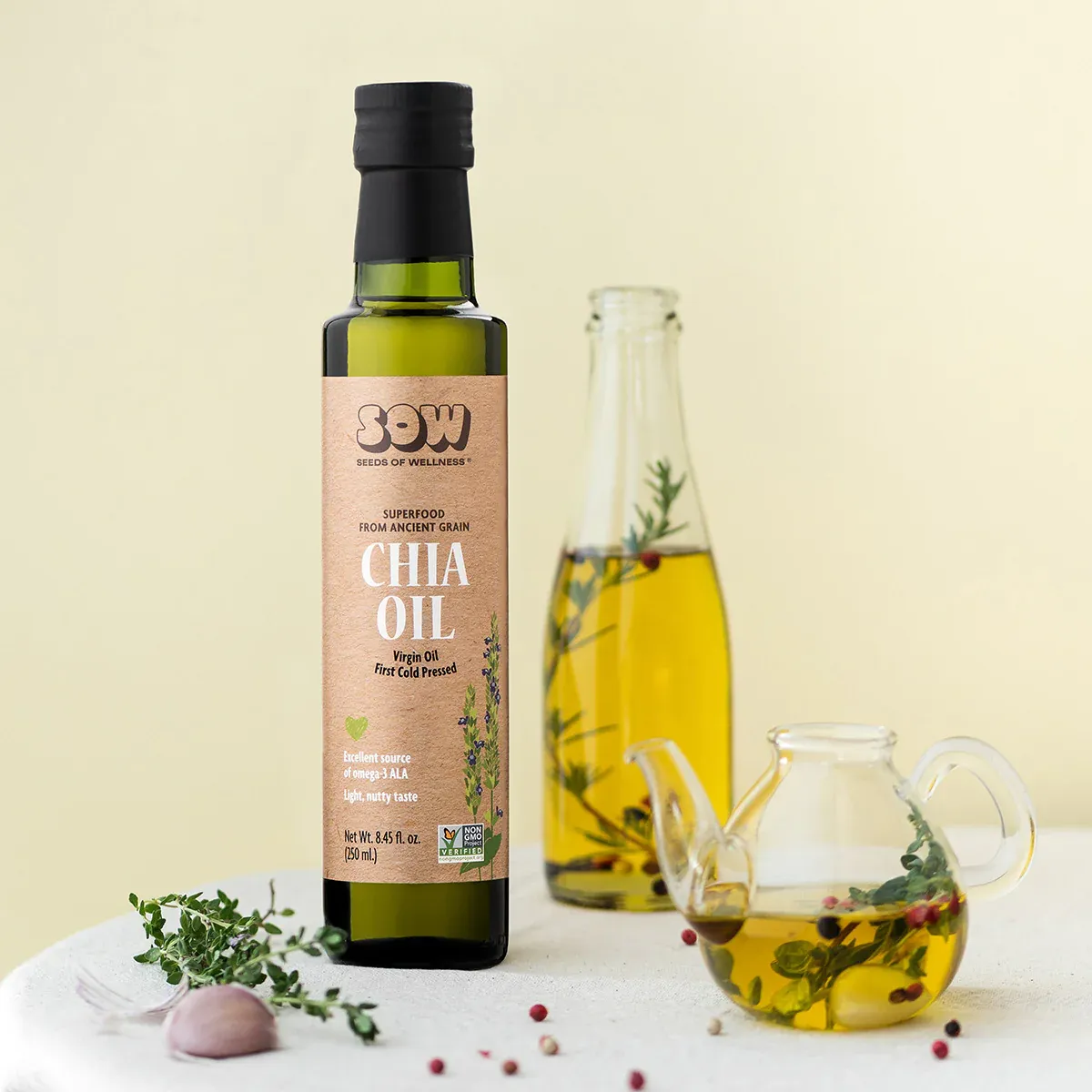
It may come as a surprise, but chia seed oil has extensive health benefits beyond just being great for the skin. This oil is rich in Omega-3 fatty acids and has the potential to increase the absorption of other crucial nutrients like vitamins K and A. SOW Chia Seed Oil is an excellent way to incorporate this ancient grain into your diet, and it's naturally gluten-free, making it safe for individuals with allergies or sensitivities. Moreover, SOW's chia seed oil is non-GMO verified, making it an ideal option for those who are particular about the products they use. For people with specific dietary restrictions, this oil is both vegan and Keto-friendly. The best part is, that chia seed oil has a high smoke point, making it suitable for high-heat cooking or any other cooking method.
8) Nutiva Hemp Seed Oil
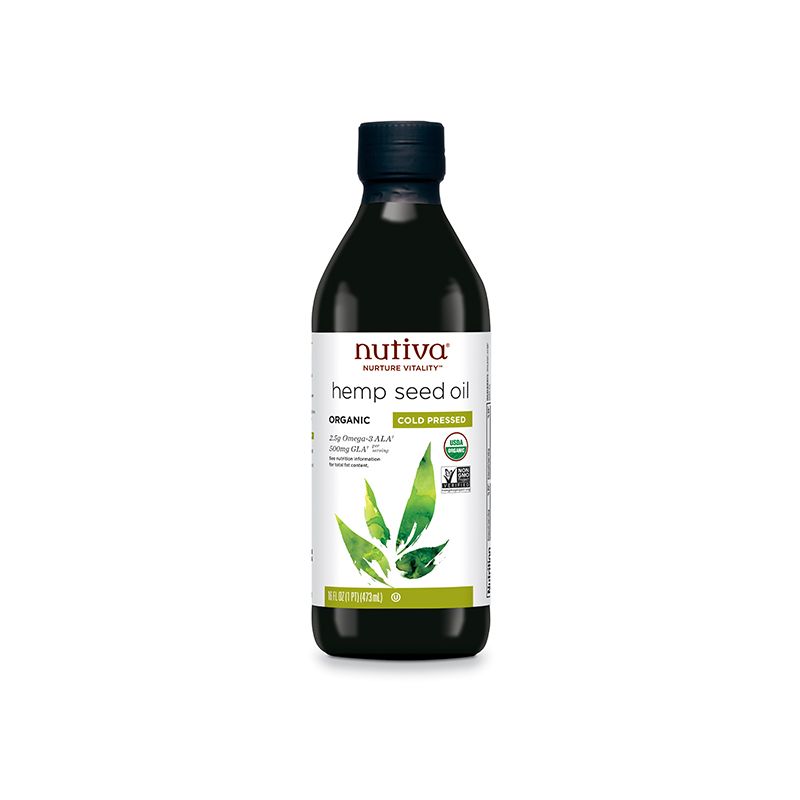
Unrefined and cold-pressed, Nutiva Hemp Seed Oil is ideal for your low-to-medium heat culinary creations (avoid high-heat frying). Its velvety texture and delightful flavor make it equally enjoyable in raw applications. A single serving of this oil delivers a bounty of nutritional benefits, including 7.5g of Omega-6 LA, 2.5g of Omega-3 ALA, 2.0g of Omega-9, 500mg of Omega-6 GLA, and 250mg of Omega-3 SDA. In essence, this blend is excellent for promoting heart health.
9) Flora Organic Sesame Oil
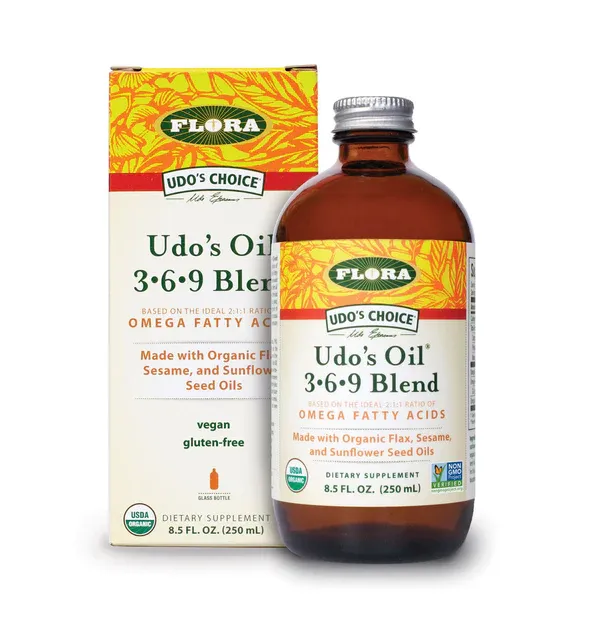
Although often overshadowed in the Western hemisphere, sesame oil is a culinary gem widely embraced in Asian cuisine. Brands like Flora ensure top-notch quality with their certified organic offerings. Their sesame oil, extracted through cold-pressing, maintains its purity, containing solely organic sesame oil without any added extraction aids or chemicals. Rich in beneficial monounsaturated fats and plant-derived short-chain fatty acids (SCFAs), sesame oil boasts anti-inflammatory, immunoregulatory, and anti-obesity properties. It's best suited for cooking low-to-medium heat dishes, handling temperatures up to 350 degrees Fahrenheit with ease.
10) Thrive Market Organic Rice Bran Oil
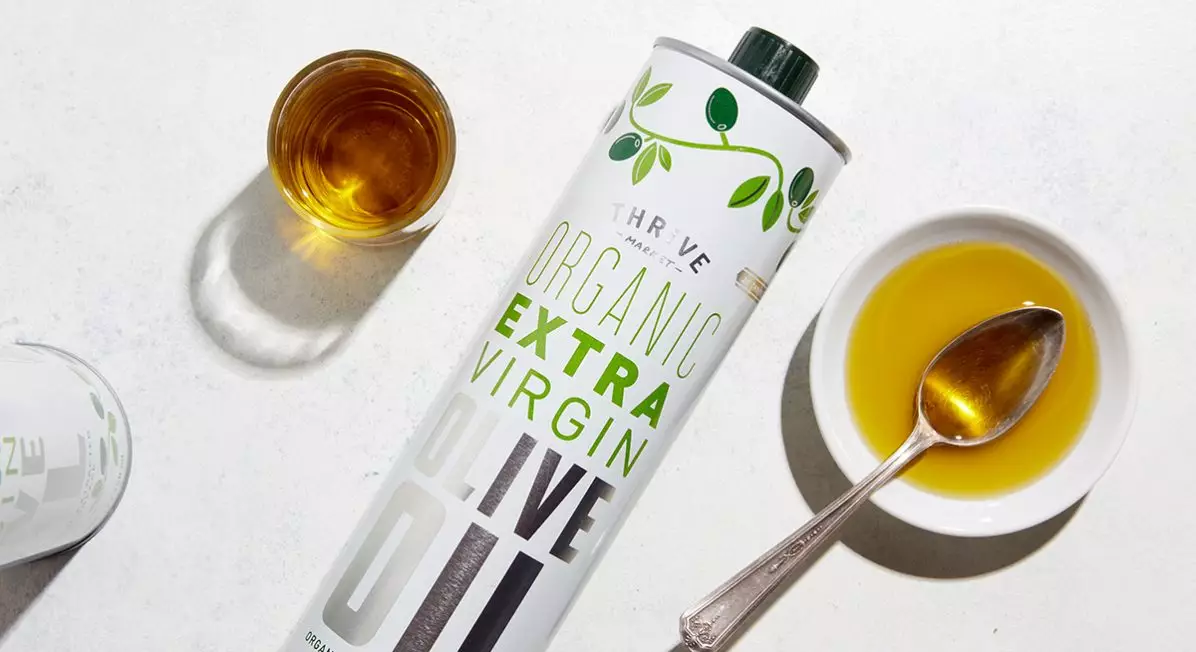
Rice bran oil is increasingly recognized as a healthful cooking option, thanks to its harmonious fat profile and the abundance of distinctive antioxidants it contains. Its elevated levels of unsaturated fats, encompassing both monounsaturated and polyunsaturated fats, play a pivotal role in promoting heart health. Moreover, its minimal saturated fat content positions it favorably for supporting optimal cholesterol levels. Furthermore, rice bran oil is endowed with oryzanol, a compound renowned for its cholesterol-lowering effects and potential anti-inflammatory properties.

